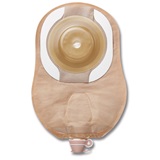5 Surprising Facts About Peristomal Skin Problems
It might surprise you to know that peristomal skin complications (PSCs) are often not reported to health care providers. Explore some other surprising facts about PSCs.

Learn more about peristomal skin complications.
When you have an ostomy, the health of your peristomal skin should be one of your highest priorities. Unfortunately, peristomal skin complications (PCSs) are far too common. Here are some eye-opening facts about just how common they are, their impact, and how they are often not reported.
Surprising fact #1: About 75% of people with ostomies develop a Peristomal Skin Complication at some point in their lives.1
In addition:
- 37% of people with ostomies surveyed developed a PSC within the first 90 days after surgery2
- Of the 37% who developed a PSC, 55% of them did so within their initial hospital stay2
- Peristomal itching was reported by 87% of individuals with stomas3
Surprising fact #2: Many people with Peristomal Skin Complications do not tell their clinicians.
Even though 87% of patients reported experiencing peristomal skin itching, nearly 2/3 of them never talked to their healthcare provider about it.4 This seems to indicate that most patients believe skin problems are a normal part of living with a stoma. They may not even recognize they have a problem—or if they do—they often choose not to seek help.
Surprising fact #3: According to research conducted by health economists, Peristomal Skin Complications negatively impact health-related quality of life.
A person living with a stoma without skin complications ranks their own wellbeing about the same as an average person. With even mild PSCs, however, self-reported quality of life starts to decline.5
Surprising fact #4: People with severe Peristomal Skin Complications rank their quality of life similar to those with serious medical problems, such as heart failure and breast cancer.
This shows that severe PSCs have a significant negative impact on quality of life.5
Surprising fact #5: Peristomal Skin Complications lead to increased health care costs, for both people with ostomies and the health care system.
Individuals with PSCs have higher treatment costs, higher rates of hospital admission, and extended lengths of stay.
What it all means
Some or all of these facts may be surprising to you. What’s important is what we can learn from them. Key takeaways are:
- PSCs are very common
- PSCs can have a significant impact, including lowering your quality of life and increasing your healthcare costs
- You may be able to avoid PSCs by following a proven skin care routine and using ostomy products containing skin-nurturing ceramide
- Be sure to report any potential PSC to your doctor or stoma care nurse, even if you’re not sure there is an issue (e.g. itching)
1. Richbourgh L, Thorpe JM, Rapp CG. Difficulties experienced by the ostomate after hospital discharge. J Wound Ostomy Continence Nurs. 2007; 34(1):70-79
2. Taneja, C., Netsch, D., Rolstad, BZ., Inglese, G., Lamerato, L., Oster, G., Clinicial and Economic Burden of Peristomal Skin Complications in Patients with Recent Ostomies JWOCN 2017 COL. 44, No. 4 Page 350-357.
3. Consumer Survey of Pruritus, 2016. Hollister Data on file. (n=164)
4. Consumer Survey of Pruiritus, 2016. Hollister data on file (n=140)
5. Nichols TR, Pouching System Impact Assessment, 2013. Hollister data on file
- 7 Shares
- 62 Recommended





 Call Us
Call Us  Email Us
Email Us  Join Us!
Join Us!  Sign Up
Sign Up 